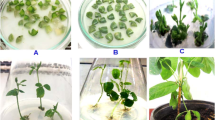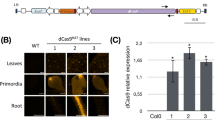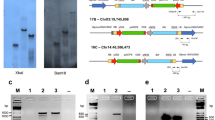Abstract
Plant productivity is greatly affected by environmental stresses such as drought, salt loading, and freezing. We reported previously that a cis -acting promoter element, the dehydration response element (DRE), plays an important role in regulating gene expression in response to these stresses. The transcription factor DREB1A specifically interacts with the DRE and induces expression of stress tolerance genes. We show here that overexpression of the cDNA encoding DREB1A in transgenic plants activated the expression of many of these stress tolerance genes under normal growing conditions and resulted in improved tolerance to drought, salt loading, and freezing. However, use of the strong constitutive 35S cauliflower mosaic virus (CaMV) promoter to drive expression of DREB1A also resulted in severe growth retardation under normal growing conditions. In contrast, expression of DREB1A from the stress inducible rd29A promoter gave rise to minimal effects on plant growth while providing an even greater tolerance to stress conditions than did expression of the gene from the CaMV promoter.
This is a preview of subscription content, access via your institution
Access options
Subscribe to this journal
Receive 12 print issues and online access
$209.00 per year
only $17.42 per issue
Buy this article
- Purchase on Springer Link
- Instant access to full article PDF
Prices may be subject to local taxes which are calculated during checkout





Similar content being viewed by others
References
Shinozaki, K. & Yamaguchi-Shinozaki, K. Molecular responses to drought and cold stress. Curr. Opin. Biotechnol. 7, 161–167 (1996).
Thomashow, M.F. in Arabidopsis. (eds Meyrowitz, E. & Somerville, C.) 807–834 (Cold Spring Harbor Laboratory Press, Cold Spring Harbor, NY, 1994).
Shinozaki, K. & Yamaguchi-Shinozaki, K. Gene expression and signal transduction in water-stress response. Plant Physiol. 115, 327–334 (1997).
Ingram, J. & Bartels, D. The molecular basis of dehydration tolerance in plants. Ann. Rev. Plant Physiol. Plant Mol. Biol. 47, 377–403 ( 1996).
Bray, E.A. Plant responses to water deficit. Trends Plant Sci. 2, 48–54 (1997).
Holmberg, N. & Bulow, L. Improving stress tolerance in plants by gene transfer. Trends Plant Sci. 3, 61 –66 (1998).
Tarczynski, M. & Bohnert, H. Stress protection of transgenic tobacco by production of the osmolyte mannitol. Science 259, 508–510 (1993).
KaviKishor, P.B., Hong, Z., Miao, G.-U., Hu, C.-A.H. & Verma, D.P.S. Overexpression of Δ ´-pyrroline-5-carboxylate synthetase increases proline production and confers osmotolerance in transgenic plants. Plant Physiol. 108, 1387– 1394 (1995).
Hayashi, H., Mustardy, L., Deshnium, P., Ida, M. & Murata, N. Transformation of Arabidopsis thaliana with the codA gene for choline oxidase: accumulation of glycinebetaine and enhanced tolerance to salt and cold stress. Plant J. 12, 133–142 (1997).
Kodama, H., Hamada, T., Horiguchi, G., Nishimura, M., & Iba, K. Genetic enhancement of cold tolerance by expression of a gene for chloroplast ω-3 fatty acid desaturase in transgenic tobacco. Plant Physiol. 105, 601–605 (1994).
Ishizaki-Nishizawa, O. et al. Low-temperature resistance of higher plants is significantly enhanced by a nonspecific cyanobacterial desaturase. Nat. Biotechnol. 14, 1003–1006 (1996).
Xu, D. et al. Expression of a late embryogenesis abundant protein gene, HVA1, from barley confers tolerance to water deficit and salt stress in transgenic rice. Plant Physiol. 110, 249–257 (1996).
McKersie, B.D., Bowley, S.R., Harjanto, E. & Leprince, O. Water-deficit tolerance and field performance of transgenic alfalfa overexpressing superoxide dismutase. Plant Physiol. 111, 1177–1181 (1996).
Yamaguchi-Shinozaki, K. & Shinozaki, K. Characterization of the expression of a desiccation-responsive rd29 gene of Arabidopsis thaliana and analysis of its promoter in transgenic plants. Mol. Gen. Genet. 236, 331–340 (1993).
Nordin, K., Heino, P. & Palva, E.T. Separate signal pathways regulate the expression of a low-temperature-induced gene in Arabidopsis thaliana (L.) Heynh. Plant Mol. Biol. 16, 1061–1071 (1991).
Kurkela, S. & Borg-Franck, M. Structure and expression of kin2, one of two cold- and ABA-induced genes of Arabidopsis thaliana. Plant Mol. Biol. 19, 689– 692 (1992).
Gilmour, S. J, Artus, N.N. & Thomashow, M.F. cDNA sequence analysis and expression of two cold-regulated genes of Arabidopsis thaliana. Plant Mol. Biol. 18, 13–21 ( 1992).
Iwasaki, T., Kiyosue, T., Yamaguchi-Shinozaki, K. & Shinozaki, K. The dehydration-inducible rd17 (cor47) gene and its promoter region in Arabidopsis thaliana. Plant Physiol. 15, 1287 (1997).
Yamaguchi-Shinozaki, K. & Shinozaki, K. A novel cis-acting element in an Arabidopsis gene is involved in responsiveness to drought, low-temperature, or high-salt stress. Plant Cell 6, 251–264 (1994).
Wang, H., Datla, R., Georges, F., Loewen, M. & Cutler, A.J. Promoters from kin1 and cor6.6, two homologous Arabidopsis thaliana genes: transcriptional regulation and gene expression induced by low temperature, ABA osmoticum and dehydration. Plant Mol. Biol. 28, 605– 617 (1995).
Liu, Q. et al. Two transcription factors, DREB1 and DREB2, with an EREBP/AP2 DNA binding domain, separate two cellular signal transduction pathways in drought- and low temperature-responsive gene expression, respectively, in Arabidopsis. Plant Cell 10, 1391–1406 (1998).
Stockinger, E.J., Gilmour, S.J. & Thomashow, M.F. Arabidopsis thanliana CBF1 encodes an AP2 domain-containing transcriptional activator that binds to the CrepeatlDRE, a cis-acting DNA regulatory element that stlmulates transcription in response to low temperature and water deficit. Proc. Natl. Acad. Sci. USA 94, 1035–1040 (1997).
Jaglo-Ottosen, K.R., Gilmour, S.J., Zarka, D.G., Schabenberger, O. & Thomashow, M.F. Arabidopsis CBF1 overexpression induces cor genes and enhances freezing tolerance. Science 280, 104–106 (1998).
Mituhara, I. et al. Efficient promoter cassettes for enhanced expression of foreign genes in dicotyledonous and monocotyledonous plants. Plant Cell Physiol. 37, 49–59 ( 1996).
Bechtold, N., Ellis, J. & Pelletier, G. In planta Agrobacterium-mediated gene transfer by infiltration of adult Arabidopsis thaliana plants. CR Acad. Sci. Paris, Life Sci. 316, 1194-1199 (1993).
Kiyosue, T., Yamaguchi-Shinozaki, K. & Shinozaki, K. Characterization of two cDNAs (ERD10 and ERD14) corresponding to genes that respond rapidly to dehydration stress in Arabidopsis thaliana. Plant Cell Physiol. 35, 225–231 (1994).
Yoshiba, Y. et al. Correlation between the induction of a gene for Δ'-pyrroline-5-carboxylate synthetase and accumulation of proline in Arabidopsis thaliana under osmotic stress. Plant J. 7, 751– 760 (1995).
Kiyosue, T., Yamaguchi-Shinozaki, K. & Shinozaki, K. Characterization of cDNA for a dehydration-inducible gene that encodes a CLP A, B-like protein. Biochem. Biophys. Res. Comm. 196, 1214–1220 ( 1993).
Yamaguchi-Shinozaki, K. & Shinozaki, K. The plant hormone abscisic acid mediates the drought-induced expression but not the seed-specific expression of rd22, a gene responsive to dehydration-stress in Arabidopsis thaliana. Mol. Gen. Genet. 238, 17– 25 (1993).
Yamaguchi-Shinozaki, K. & Shinozaki, K. Arabidopsis DNA encoding two desiccation-responsive rd29 genes. Plant Physiol. 101, 1119–1120 (1993).
Dure, L. II I et al. Common amino acid sequence domains among the LEA proteins of higher plants. Plant Mol. Biol. 12, 475– 486 (1989).
Ingram J. & Bartels, D. The molecular basis of dehydration tolerance in plants. Ann. Rev. Plant Physiol. Plant Mol. Biol. 47, 377–403 ( 1996).
Lin, C. & Thomashow, M.F. DNA sequence analysis of complementary DNA for cold-regulated Arabidopsis gene corl5 and characterization of the COR15 polypeptide. Plant Physiol. 99, 519–525 (1992).
Artus, N.N. et al. 1996. Constitutive expression of the cold-regulated Aradidopsis thaliana COR15a gene affects both chloroplast and protoplast freezing tolerance. Proc. Natl. Acad. Sci. USA 93, 13404–13409 (1996).
Jiang, C., Iu, B. & Singh, J. Requirement of a CCGAC cis-acting element for cold induction of the BN115 gene from winter Brassica napus. Plant Mol. Biol. 30, 679–684 (1996).
Ouellet, F., Vazquez-Tello, A. & Sarhan, F. 1998. The wheat wcs120 promoter is cold-inducible in both monocotyledonous and dicotyledonous species. FEBS Lett. 423, 324–328 ( 1998).
Acknowledgements
The authors thank Satomi Yoshida, Atsuko Konishi, and Ekuko Ohgawara for their excellent technical assistance. This work was supported in part by the Program for Promotion of Basic Research Activities for Innovative Biosciences, which awarded a grant to K.Y.-S. This work was also supported in part by the Special Coordination Fund of the Science and Technology Agency, by the Hunan Frontier Science Program, and by a grant in aid from Japan's Ministry of Education, Science, and Culture to K.S.
Author information
Authors and Affiliations
Corresponding author
Rights and permissions
About this article
Cite this article
Kasuga, M., Liu, Q., Miura, S. et al. Improving plant drought, salt, and freezing tolerance by gene transfer of a single stress-inducible transcription factor. Nat Biotechnol 17, 287–291 (1999). https://doi.org/10.1038/7036
Received:
Accepted:
Issue Date:
DOI: https://doi.org/10.1038/7036
This article is cited by
-
Exogenous melatonin induces salt and drought stress tolerance in rice by promoting plant growth and defense system
Scientific Reports (2024)
-
Engineering the Transcriptional Regulatory Network to Improve Abiotic Stress Tolerance in Crop Plants: Taming the Tough Time
Journal of Plant Growth Regulation (2024)
-
Genome-Wide Analysis of DREB Genes in Sugar Beet and Their Potential Functions in Response to Drought Stress
Sugar Tech (2024)
-
Cellular dynamics in the maize leaf growth zone during recovery from chilling depends on the leaf developmental stage
Plant Cell Reports (2024)
-
Overexpression of a WRKY transcription factor McWRKY57-like from Mentha canadensis L. enhances drought tolerance in transgenic Arabidopsis
BMC Plant Biology (2023)



